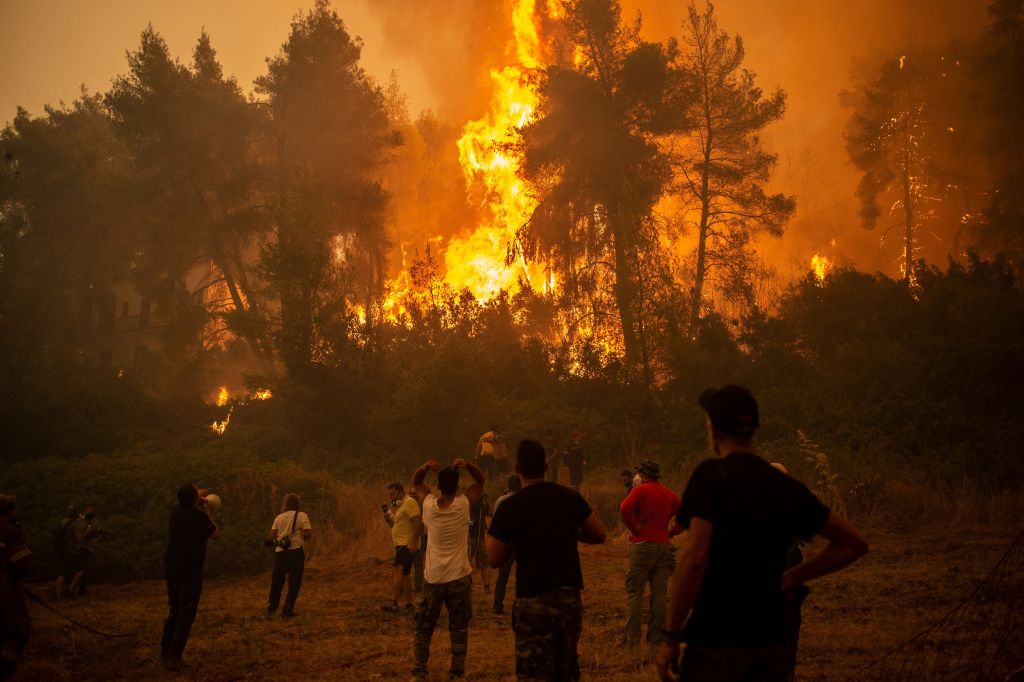U.N.-backed climate panel issues a dire report that contains a sliver of positive news


A free daily email with the biggest news stories of the day – and the best features from TheWeek.com
You are now subscribed
Your newsletter sign-up was successful
The Intergovernmental Panel on Climate Change (IPCC) released a dire report Monday warning that the world was already locked into more weather-related disasters, higher sea levels and more acidic oceans, and other significant changes to the planet due to greenhouse gases humans have sent into the atmosphere since the 1850s. United Nations Secretary General António Guterres called the report's findings "a code red for humanity" and said we owe it to "the entire human family" to cut emissions fast and sharply to avoid irreversible catastrophe.
But amid the stark warnings of "unprecedented" environmental changes human actions are provoking, the IPCC said the worst-case scenario it laid out in its 2013 report is actually less likely eight years later.
The 234 climate scientists who compiled IPCC's sixth report laid out five scenarios, based on how much action countries take to combat climate change. In each scenario, the world fails to meet the most ambitious target from the 2015 Paris climate agreement: keeping the rise in global temperatures under 1.5 degrees Celsius above preindustrial levels. The world is now expected to surpass that mark in the 2030s.
The Week
Escape your echo chamber. Get the facts behind the news, plus analysis from multiple perspectives.

Sign up for The Week's Free Newsletters
From our morning news briefing to a weekly Good News Newsletter, get the best of The Week delivered directly to your inbox.
From our morning news briefing to a weekly Good News Newsletter, get the best of The Week delivered directly to your inbox.
Under the best-case scenario — humanity replaces fossil fuels with renewable energy by 2050 and changes how it eats, lives, and travels — the temperature would drop slightly after hitting 1.5 degrees next decade. In the worst case, in which the world takes no action, global temperatures would be about 3.3 degrees Celsius above 19th century levels by the end of the century. The past five IPCC reports assumed the world was on this hottest "business as usual" path, but now the climate scientists see us somewhere in between either slowing emissions considerably or reducing them slightly, according to study co-author Claudia Tebaldi, a scientist at the U.S. Pacific Northwest National Lab.
"We are a lot less likely to get lucky and end up with less warming than we thought," said Zeke Hausfather at the Breakthrough Institute and a report co-author. "At the same time, the odds of ending up in a much worse place than we expected if we do reduce our emissions are notably lower."
"Things are going to change for the worse. But they can change less for the worse than they would have, if we are able to limit our footprint now," Tebaldi said. "Every little bit counts."
A free daily email with the biggest news stories of the day – and the best features from TheWeek.com
Peter has worked as a news and culture writer and editor at The Week since the site's launch in 2008. He covers politics, world affairs, religion and cultural currents. His journalism career began as a copy editor at a financial newswire and has included editorial positions at The New York Times Magazine, Facts on File, and Oregon State University.
-
 The Olympic timekeepers keeping the Games on track
The Olympic timekeepers keeping the Games on trackUnder the Radar Swiss watchmaking giant Omega has been at the finish line of every Olympic Games for nearly 100 years
-
 Will increasing tensions with Iran boil over into war?
Will increasing tensions with Iran boil over into war?Today’s Big Question President Donald Trump has recently been threatening the country
-
 Corruption: The spy sheikh and the president
Corruption: The spy sheikh and the presidentFeature Trump is at the center of another scandal
-
 How climate change is affecting Christmas
How climate change is affecting ChristmasThe Explainer There may be a slim chance of future white Christmases
-
 Blue Origin launches Mars probes in NASA debut
Blue Origin launches Mars probes in NASA debutSpeed Read The New Glenn rocket is carrying small twin spacecraft toward Mars as part of NASA’s Escapade mission
-
 Why scientists are attempting nuclear fusion
Why scientists are attempting nuclear fusionThe Explainer Harnessing the reaction that powers the stars could offer a potentially unlimited source of carbon-free energy, and the race is hotting up
-
 Dinosaurs were thriving before asteroid, study finds
Dinosaurs were thriving before asteroid, study findsSpeed Read The dinosaurs would not have gone extinct if not for the asteroid
-
 Canyons under the Antarctic have deep impacts
Canyons under the Antarctic have deep impactsUnder the radar Submarine canyons could be affecting the climate more than previously thought
-
 SpaceX breaks Starship losing streak in 10th test
SpaceX breaks Starship losing streak in 10th testspeed read The Starship rocket's test flight was largely successful, deploying eight dummy satellites during its hour in space
-
 NASA is moving away from tracking climate change
NASA is moving away from tracking climate changeThe Explainer Climate missions could be going dark
-
 Rabbits with 'horns' sighted across Colorado
Rabbits with 'horns' sighted across Coloradospeed read These creatures are infected with the 'mostly harmless' Shope papilloma virus
